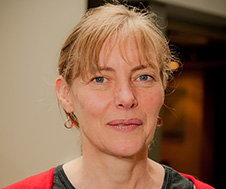 Thursday 14 December 2017 9:31am
Thursday 14 December 2017 9:31am
Research led by OUW's Professor Nick Wilson has found that Google's virtual assistant performs better in online searches for sexual health advice than Apple's Siri.
In an article published today in the Christmas issue of the British Medical Journal, New Zealand researchers found that Google laptop searches performed better at finding online sexual health advice than the digital assistants on smartphones. Of these assistants, Google Assistant clearly out-performed Siri.
The team of researchers led by the University of Otago, Wellington's Professor Nick Wilson investigated how well the internet and digital assistants answered 50 questions on sexual health.

Dr Jane McDonald, co-researcher in this study.
The background to this work included a 2017 UK survey of 3221 people aged 16 years or older which found that 41 per cent of internet users go online for health related question, with half of these (22 per cent of the total) having done so in the previous week.
This led the NZ researchers to investigate the quality of various online sexual health advice and to consider the role of digital assistants in smartphones.
“To find out whether smartphones and their digital assistants offer quality sexual health advice, we jumped into bed (albeit independently), pulled out our smartphones, and asked Siri and Google Assistant. We then compared their answers with a laptop based Google search,” says Professor Wilson.
The researchers who have a variety of accents (Kiwi, Kiwi/Scottish and Kiwi/Ulster English), selected 50 questions, mainly from expert sources, to test the software.
They were surprised that expert sources were identified around half the time (for the best responses), and some of these were expert local NZ services, for example, the NZ Family Planning Association and a NZ university site. But they reported that all the online approaches could do better at finding expert information.
“We also got some odd responses, such as a question about menopause which came up with the Wikipedia site for the show 'Menopause the Musical' and another interpreted STI (sexually transmitted infections) as a stock market code,” says Professor Wilson.
“Our research findings show the importance of improving digital literacy in the general population.”
“The research also shows that more needs to done to encourage internet users to treat information in online lifestyle magazines with caution as compared to expert sources,” he says.
Read the British Medical Journal media release here: http://www.bmj.com/cgi/doi/10.1136/bmj.j5635 or the full paper (which includes the 50 questions) here: http://press.psprings.co.uk/bmj/december/technology.pdf.
The University of Otago Wellington is holding a seminar on Friday 15th December on this research, called In bed with Siri and Google Assistant: A comparative analysis of sexual health advice, with speakers Professor Nick Wilson (Department of Public Health) and Dr Jane McDonald (Department of O&G). You can find out more information here.
For further information contact:
Professor Nick Wilson
Department of Public Health
University of Otago, Wellington
Mob +64 21 2045 523
Email nick.wilson@otago.ac.nz
A list of Otago experts available for media comment is available elsewhere on this website.
Electronic addresses (including email accounts, instant messaging services, or telephone accounts) published on this page are for the sole purpose of contact with the individuals concerned, in their capacity as officers, employees or students of the University of Otago, or their respective organisation. Publication of any such electronic address is not to be taken as consent to receive unsolicited commercial electronic messages by the address holder.
